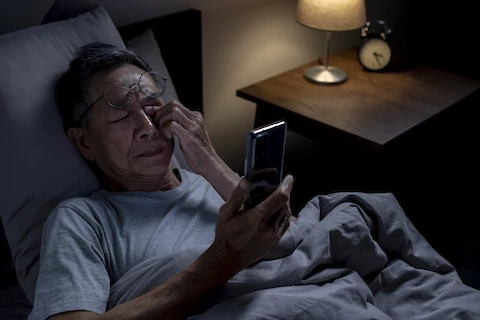
Are you finding it difficult to get quality sleep at night? You might not realize that the culprit could be something as seemingly harmless as the light from your favorite gadgets. We all love to catch up on our favorite TV shows or perhaps read an eBook before bed. But did you know that devices like televisions, computers, and smartphones emit a type of light that can potentially disturb your sleep?
Let’s delve into the world of “blue light,” its effects on our sleep, and, most importantly, how you can limit its impact to get that sweet, quality sleep that you deserve. Allow us to guide you on this illuminating journey!
Understanding Blue Light
Don't let the name fool you. Blue light isn't about the color of your screen. It's a type of light with short wavelengths that produce a high amount of energy. The sources of this notorious light are the modern gadgets we use every day—televisions, smartphones, and computers, to name a few.
The Connection Between Blue Light and Sleep Quality
You may wonder how this blue light affects your sleep. Well, exposure to blue light disrupts our body's natural sleep-wake cycle, also known as the circadian rhythm. During the day, it's not much of an issue. But too much blue light exposure late in the evening can trick your brain into thinking it's still daytime. This inhibits the production of melatonin, a hormone that signals your body it's time for bed. For seniors, getting enough quality sleep is crucial for maintaining good health, and blue light can become a significant barrier to that.
Practical Tips for Reducing Blue Light Exposure
Now, let's get practical! One of the simplest ways to reduce blue light exposure is by limiting our screen time, especially in the evening hours. Consider setting a digital curfew for yourself an hour or so before bedtime.
Another handy way of tackling this problem is by adjusting the settings on your devices. Many smartphones, computers, and tablets today come with built-in settings to reduce blue light emission. Look for a "Night Shift" or a similar setting and set it to turn on automatically in the evening. This will adjust the color temperature of your screen to the warmer end of the spectrum, reducing the amount of blue light it emits.
Alternatives to Screen Time Before Bed
Of course, if you're used to winding down with your favorite gadget, cutting down screen time might seem difficult. But there are plenty of other relaxing activities you could engage in before bed. How about reading a good old-fashioned paperback book? Or perhaps you might enjoy listening to some soft music or a podcast? Maybe even a short evening stroll would do the trick. All these activities can help you wind down without the disruptive influence of blue light.
Get Other Ideas From Senior Helpers Ellis County
If you've been struggling with sleep quality, it's definitely worth considering your exposure to blue light. Limiting screen time, adjusting device settings, and engaging in alternatives to screen-based activities can significantly improve the sleep you're getting.
Remember, we at Senior Helpers Ellis County are always here to offer assistance and services to seniors in Waxahachie, Ennis, Mansfield, Alvarado, and nearby. If you need any help managing your routine or having a more structured environment, don't hesitate to contact us. Your good night's sleep could be one call away.